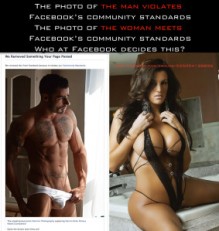Why abortion is allowed, but a nipple isn’t. The random censorship of Facebook.
Because Facebook is free, the folks up in California decide what is allowed, and what is not. This often leads to random acts of censorship by prudish Americans. The policy is not completely clear, but just like Google, Facebook has the last word. “We work to foster an environment where everyone can openly discuss issues and express their views, while respecting the rights of others”, is one of their key theories. Does that work, in practice? Isn’t it much too easy to close down someone’s Facebook-account?
Norms and rules, for transparency and openness?
After the launch of Facebook in 2004, the number of users grew so exponentially that the platform did not have many qualms about creating usage rules and limitations. What is more: in the course of time more and more restrictions were applied, after users had broken norms and eve n laws.
n laws.
Contrary to obscure networks like Silk Road or Darknet, or the anonymity of The Onion Router, Facebook thrives with transparency and openness in the public domain. On Facebook there are rules and norms, but these can be rather subjective. The largest common denominator of 1.5 billion users is – unlike communities in smaller networks – not liberal, progressive, naughty or illegal. However, this arbitrariness makes it rather easy toclose down someone’s account. Here are a few glitches.
Snitches
The people at Facebook cannot personally monitor all content, so they are often led by “snitches”. This concerns people who feel “insulted”, where they often refer to far-fetched reasons, such as:
- “This fish doesn’t look like a fish, it looks like a man’s private parts, and I have small children around me during the day.”
- “I saw this on my feed and I do not approve – please take it off.”
- “I don’t believe in this coin. It goes against what I believe in.”
- “Can you remove this picture – I don’t like it.”
- This is not true, my God would never let this happen.
Reasoning like this, it is easy to find a whole lot of bad, yes even despicable content. Time and time again, it shows that this can lead to the wrong results.
In 2011 a number of accounts of tech companies were closed, because someone had complained about a breach of patent. Instead of researching the background of this claim (expensive lawyers! – or just laziness?) Facebook rather plays safe and just shuts down the reported pages – even without notifying the owners, or indicating what the disputed content is. Vaguely, they refer to the ramshackle Statement of Rights and Responsibilities.
Ars Technica, one of the most prominent victims, wrote: “Do you have enemies on Facebook? Facebook is so eager to protect copyright that a simple accusation is sufficient to have an account closed”.
Prudeness
 There was a little scandal about the removal of an innocent picture of two kissing men – from the ultra-
There was a little scandal about the removal of an innocent picture of two kissing men – from the ultra- popular TV series Eastenders, no less – and a little bit later about a woman breastfeeding. Most of these “scandals” end in virals, campaigns and a correction with some vague excuses.
popular TV series Eastenders, no less – and a little bit later about a woman breastfeeding. Most of these “scandals” end in virals, campaigns and a correction with some vague excuses.
The village of Effin (Ireland) was not permitted to be listed as residence for members for a long time, because it could be considered as insulting. Really? In 2012, it was finally allowed.
Insults
One step further: Facebook is hypersensitive about insults. This makes it very easy for censor-keen trolls and naggers to strike. Especially if they operate as a group: after all, if you receive 10 complaints about one user, they MUST be true. To this effect, the page of sex-journalist Violet Blue was closed down, after anti-porn activist had violently complained. Critics of Islam were removed after members of a fundamental group had gotten their panties in a twist over these heretics.
Secretiveness and extortion
Because Facebook seldomly gives the reason for a block – probably so that the do not have to admit how ridiculous their policy is – victims often end up in a Kafka-ish hell of standard emails and useless FAQs. This may be easy for Facebook, it also gives them a bad name! Complaints are hardly checked, there are strong signs of arbitrariness, homophobia and prudeness in general. Policy is not defined by content itself, but by the (number of) complaints. What can also play a role is that Facebook would like to be admitted to the Chinese market: if they are the best behaved pupil, this might help.
There are also cases of extortion known: a malevolent user would not mind revoking his complaint if the victim would pay a sum of money.
Stage names and other fictitious names
A few years ago artists were forced to use their real name, instead of their stage name. All artists? No, just drag queens, because names like Dolly Bellefleur of course are too festive to allow. At the same time, everyone can assume an alias if they do not wish to be found by friends form a different life or dark past: in Amsterdam alone there are dozens, if not hundreds, of people who have replaced their last name with “Amsterdam”. It is against the policy, but if there are no complaints, no action is taken.

The policy regarding show names was reversed late last year, after activists had spoken up – a petition with over 36,000 signatures was the result. An official excuse of Chris Cox, the Chief Product Officer, followed in an ‘all-inclusive’ American way: “I want to apologise to the affected community of drag queens, drag kings, transgender, and extensive community of our friends, neighbours, and members of the LGBT community for the hardship that we’ve put you through in dealing with your Facebook accounts over the past few weeks.” So, bygones!
BTW: this situation was the result of hundreds of complaints – originating fromone single user, which nobody noticed. Additional effect was that the customer service regarding complaints would be improved.
The numbers
What numbers are we talking about? Rumour has it that there are more than 1 million complaints each week, where other sources even mention 250,000 per hour.
Most complaints are dealt with by algorithms, but there are also teams of censors (think Catch 22). Because labour costs are quite relevant, this work is largely outsourced to low wage countries, such as Morocco. A whistle-blower, who was hired for $1 per hour to censor, reported how Facebook puts emphasis on porn, raunchiness, racism and cyberbullying. There is a (secret) manual of 17 pages, listing the things that are allowed and which are not.
What is allowed?
Marihuana is no problem, other drugs are. Hate speech can only be tolerated if it is used as a joke. Animal cruelty can be shown if it is clear that the user rejects it. Abortion is not taboo, unless it breaks the rules of nudity.
What is not allowed?
 The manual mentions “camel toes” and “moose knuckles” (yes, there is a male variety), sex toys – but only if shown in the context of sex – and all sort of fetishes. But pictures of drunk or unconscious people with a drawing on their face are not permitted either.
The manual mentions “camel toes” and “moose knuckles” (yes, there is a male variety), sex toys – but only if shown in the context of sex – and all sort of fetishes. But pictures of drunk or unconscious people with a drawing on their face are not permitted either.
And a great one: “ANY photoshopped images of people, whether negative, positive or neutral.” In a recent update, these positive revisions are allowed, just like showing most “bodily fluids”.

You are not allowed to compare two people photographically – which is very ironic, because this was the very purpose for which The Facebook was set up originally!
Sexual activity is not allowed, OK – there are plenty of other sites for that. But “foreplay” is permitted, even for man-man or woman-woman play. So, gays can also go on and touch each other. But the (contour of a) female nipple is a no-go – the male one is fine – just like what we in Dutch call “construction worker’s cleavage”, in other words: butt-crack.
It becomes really gory when violence is concerned. Bloody pictures are fine as long as someone’s intestines are not coming out . Crushed heads and severed limbs are permitted, as well as deep flesh wounds and excessive blood – this is all described literally! You cannot deny the Holocaust or insult Atatürk – thus international law is also observed.
. Crushed heads and severed limbs are permitted, as well as deep flesh wounds and excessive blood – this is all described literally! You cannot deny the Holocaust or insult Atatürk – thus international law is also observed.
On the other hand, necrophilia, paedophilia, beheadings and suicides make an appearance. But that is OK: rather a beheading than a nipple, after all. The life of a censor is not easy…
Nude and art
And then art. Or art with nudity. What do the Californian bosses think about that? When it concerns sex and nudity, Facebook is strictly PG13 (“Parents strongly cautioned – some material may be inappropriate for children under 13″).
 In 2012 the respectable magazine The New Yorker became the victim of censorship: a cartoon with a barely visible woman’s breast was considered intolerable.
In 2012 the respectable magazine The New Yorker became the victim of censorship: a cartoon with a barely visible woman’s breast was considered intolerable.
Art schools and museums who posted a drawing or picture of a nude on their page were confronted with removed images or blocked accounts, with the simple announcement: “You uploaded a photo that violates our terms of use, and this photo has been removed.”
One school reacted indignantly, that they found it hard to accept that Facebook had the final say – and was the online curator – of what is considered art, and what they could share with the world. Facebook’s reaction: it was a mistake, Facebook loves all art, even that with nude people appearing in it. The policy states that drawings or sculptures of nudity are allowed. However, the artist in this case had made such a lifelike drawing that the viewers might think it involved a photograph.
In short: it is OK to post a nude, but not if it concerns photos or videos, because that is not considered art (sic). And if it is a drawing, it should not appear too real. So better butcher it a bit, so that everyone can see it is ‘only’ a drawing. American Apparel (“Cotton”) can go ahead, and also Japanese cartoons are allowed.
Oh, oh, those homo’s!
 American photographer Michael Stokeswas ‘harassed’, censored and blockedmore than once. Here you go building a following of millions of fans and followers, someone complains and your whole file might be gone.
American photographer Michael Stokeswas ‘harassed’, censored and blockedmore than once. Here you go building a following of millions of fans and followers, someone complains and your whole file might be gone.
Stokes did a photoshoot with American war veteran Alex Minsky, who was wounded in action, but by sheer perseverance made it to model. The pictures show a civilized and colourful ‘nude” (he is holding a sports cup, so basically is not even nude), but with an energy and symbolism that appealed to many.
After Stokes had put the picture online, he got the message that it conflicted with “the nudity rules“, and that he was suspended for three days. Stokes could not find these rules anywhere and started to tweet. A follower, Frank Jones, placed the picture on his profile as a protest to what he considered discrimination. In a short period of time, the photo was shared over 4,000 times, until also Jones’ post was removed – and with it all shares. After some mails back and forth, the original image was placed back with apologies, but this circus repeated itself a few times, sometimes with a 30 day ban. Even de lobbysite chang.org got on the case.
Initially it appeared to be a revenge from someone who had refused to paycopyrights – later unknown plaintiffs played a rol (this is always wrapped in mystery), but the fact is that Facebook went about this in a messy way, and was driven principally by the fact that this concerned a naked MAN by a gay photographer. At the same time, sports site ESPN posted similar pictures. These were reported by Stokes’ fans, but nothing happened to them. Maybe it helps when you are a big brand, and you put money in that platform?
Nudity: yes or no?
There is no accounting for taste, so the same goes for “good taste”. Here are some examples of things that were not allowed (male torsos) and some that were (female butt crack and a… eh… bathing suit).

 The (still ongoing) dispute with Facebook did not justharm Stokes: because the story went viral, his page got over 2.5 million exposures. When he posts a new picture, sometimes he gets 70,000 likes within 24 hours – and those are veryrespectable figures! Among others, Huffington Post, E! and The Talk featured him in their programmes or websites.
The (still ongoing) dispute with Facebook did not justharm Stokes: because the story went viral, his page got over 2.5 million exposures. When he posts a new picture, sometimes he gets 70,000 likes within 24 hours – and those are veryrespectable figures! Among others, Huffington Post, E! and The Talk featured him in their programmes or websites.
Oscar Wilde said, in his wisdom: “There is only one thing in life worse than being talked about, and that is not being talked about.” If Facebook would have existed in his days, he probably would have had some smart and snide remarks about it.







Trackbacks & Pingbacks
[…] Nipples on Facebook […]
Leave a Reply
Want to join the discussion?Feel free to contribute!